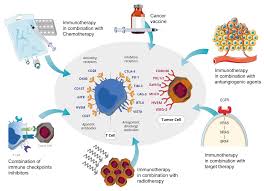Microsatellite instability-high (MSI-H) solid malignant tumors are a subset of cancers characterized by genetic hypermutability due to defects in the DNA mismatch repair (MMR) system. These tumors have gained significant clinical importance as biomarkers for predicting responses to immunotherapy, particularly immune checkpoint inhibitors targeting PD-1/PD-L1.

What is Microsatellite Instability (MSI)?
Microsatellites are short, repetitive sequences of DNA scattered throughout the genome. Normally, the MMR system corrects errors that occur during DNA replication. However, in MSI-H tumors, defective MMR leads to an accumulation of mutations, contributing to tumorigenesis.
Causes and Risk Factors
- Lynch Syndrome: A hereditary condition caused by germline mutations in MMR genes (MLH1, MSH2, MSH6, PMS2).
- Sporadic MSI-H Tumors: Often linked to hypermethylation of the MLH1 promoter.
- Environmental Factors: Smoking, diet, and carcinogenic exposures may contribute to MSI-H tumor development.
Types of Cancers Associated with MSI-H
MSI-H status is observed in various solid malignant tumors, including:
- Colorectal cancer (~15% of cases)
- Endometrial cancer (~20-30%)
- Gastric cancer (~10-20%)
- Ovarian cancer
- Biliary tract cancer
- Small bowel adenocarcinoma
- Prostate cancer
- Non-small cell lung cancer (NSCLC)
Diagnosis and Testing for MSI-H Tumors
MSI testing is crucial for guiding treatment decisions. The two main approaches include:
- Polymerase Chain Reaction (PCR)-Based MSI Testing: Detects alterations in specific microsatellite markers.
- Immunohistochemistry (IHC) for MMR Proteins: Evaluates the expression of MLH1, MSH2, MSH6, and PMS2.
- Next-Generation Sequencing (NGS): Provides a comprehensive genetic profile, identifying MSI status and tumor mutation burden (TMB).
Treatment Approaches for MSI-H Tumors
1. Immunotherapy
- PD-1/PD-L1 Inhibitors: Pembrolizumab and nivolumab have shown remarkable efficacy in MSI-H tumors by enhancing the immune response.
- CTLA-4 Inhibitors: Combination therapy with anti-CTLA-4 agents like ipilimumab may improve outcomes in certain cancers.
2. Surgery and Chemotherapy
- Resection: Primary treatment for localized tumors.
- Chemotherapy Resistance: MSI-H tumors often exhibit poor responses to fluoropyrimidine-based chemotherapy.
3. Emerging Therapies
- Tumor-Infiltrating Lymphocyte Therapy (TIL-Therapy): Enhancing the body’s immune response against tumor cells.
- Targeted Therapies: Research on combining immunotherapy with targeted drugs is ongoing.
Prognosis and Survival Rates
Patients with MSI-H tumors generally have a better prognosis than those with microsatellite-stable (MSS) tumors, particularly in colorectal and endometrial cancers. However, the response varies depending on the tumor type and stage.
Microsatellite instability-high solid malignant tumors represent a crucial biomarker for guiding treatment, particularly with immunotherapy. Advances in diagnostic testing and therapeutic strategies continue to improve patient outcomes. Early detection and genetic counseling for Lynch syndrome remain essential for high-risk individuals.

